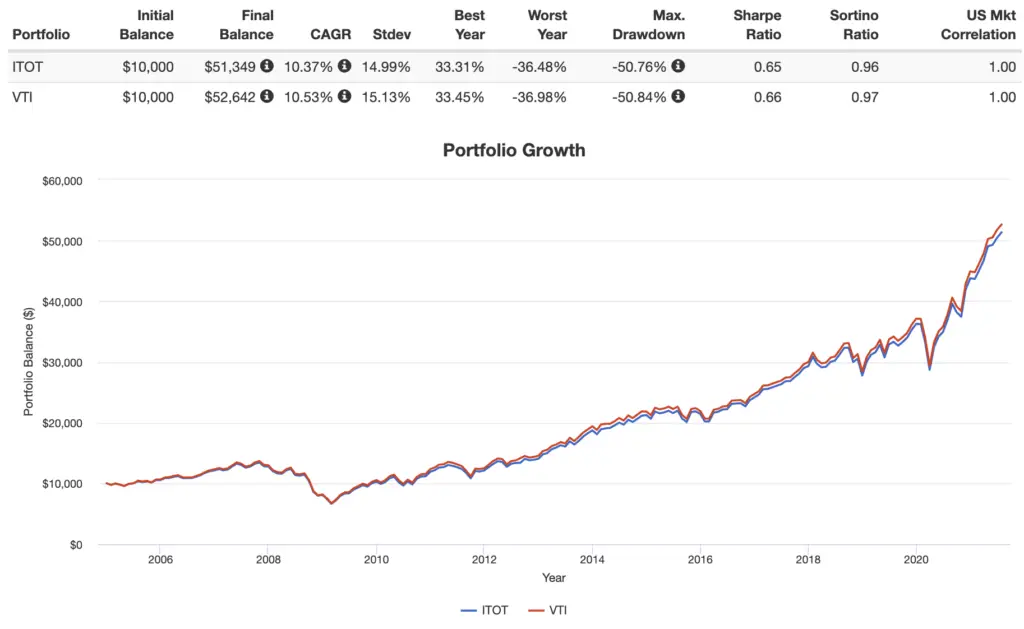Here we look at 2 ETFs for the total U.S. stock market – ITOT and VTI – from iShares and Vanguard, respectively.
In a hurry? Here are the highlights:
- ITOT and VTI are the two most popular ETFs for the total U.S. stock market.
- ITOT is from iShares. VTI is from Vanguard.
- ITOT tracks the S&P Total Market Index. VTI tracks the CRSP US Total Market Index.
- ITOT and VTI cost the same at 0.03%.
- ITOT has about 3,600 holdings. VTI has about 3,800 holdings.
- Both funds are highly liquid; both have an average spread of 0.01%.
- VTI is much more popular than ITOT.
- VTI has slightly more exposure to small- and mid-cap stocks, and has thus slightly outperformed ITOT historically.
- This is a great pair to use for tax loss harvesting purposes to avoid a wash sale.
Contents
Video
Prefer video? Watch it here:
ITOT vs. VTI – Differences in Methodology and Composition
If you've arrived on this page, you probably already know that index funds are a great way to get instant diversification across sectors and cap sizes. Thankfully, fees have also dropped in recent years to make ETFs extremely affordable for retail investors.
ITOT is the iShares Core S&P Total U.S. Stock Market ETF. It is the second most popular fund to capture the total U.S. stock market, after VTI. It was established in 2004. The fund seeks to track the famous S&P Total Market Index. ITOT has over $42 billion in assets and has a little over 3,500 holdings.
The Vanguard Total Stock Market ETF (VTI) provides similar broad exposure to the U.S. stock market. It launched in 2001. The fund seeks to track the CRSP US Total Market Index. This ETF holds about 3,800 U.S. stocks. VTI is more popular than ITOT with over $260 billion in assets.
Both of these funds are highly liquid, with an average spread of 0.01%. Sector composition is nearly identical. They also cost the same at 0.03%, and can thus be seen as interchangeable.
ITOT vs. VTI – Historical Performance
The indexes for these two funds differ very slightly. Basically, VTI gets marginally more exposure to small- and mid-caps, which likely explains its very slight historical outperformance over ITOT:

Conclusion – ITOT vs. VTI
Again, ITOT and VTI are basically interchangeable. This is definitely a great pair to use for tax loss harvesting purposes to avoid a wash sale, but given the choice of one over the other, I see no reason not to go with VTI from Vanguard. It has more assets and has, in my opinion, a bit more preferable exposure to smaller stocks.
Conveniently, both of these funds should be available at any major broker, including M1 Finance, which is the one I'm usually suggesting around here.
Do you own ITOT or VTI? Let me know in the comments.
Disclosure: I am long VTI in my own portfolio.
Disclaimer: While I love diving into investing-related data and playing around with backtests, this is not financial advice, investing advice, or tax advice. The information on this website is for informational, educational, and entertainment purposes only. Investment products discussed (ETFs, mutual funds, etc.) are for illustrative purposes only. It is not a research report. It is not a recommendation to buy, sell, or otherwise transact in any of the products mentioned. I always attempt to ensure the accuracy of information presented but that accuracy cannot be guaranteed. Do your own due diligence. I mention M1 Finance a lot around here. M1 does not provide investment advice, and this is not an offer or solicitation of an offer, or advice to buy or sell any security, and you are encouraged to consult your personal investment, legal, and tax advisors. Hypothetical examples used, such as historical backtests, do not reflect any specific investments, are for illustrative purposes only, and should not be considered an offer to buy or sell any products. All investing involves risk, including the risk of losing the money you invest. Past performance does not guarantee future results. Opinions are my own and do not represent those of other parties mentioned. Read my lengthier disclaimer here.

Are you nearing or in retirement? Use my link here to get a free holistic financial plan and to take advantage of 25% exclusive savings on financial planning and wealth management services from fiduciary advisors at Retirable to manage your savings, spend smarter, and navigate key decisions.

I really enjoy your posts! Are you saying that I could hold VTI in my roth and ITOT in taxable and that combo would work fine?
Thanks, Megan! That’d work if you want to tax loss harvest with one of them. If not, holding the same fund in different accounts is perfectly fine.
Hey John,
Thank you for this article and your blog. I really value your posts and opinions, which help me get more comfortable and knowledgeable in the investing area.
I couldn’t find a post about it here: Did you write a post about tax loss harvesting? If not, are you considering writing about this and explain what it is, how it works and when it could/should be applied?
I’d be very interested in such an article from you.
Keep up the good work!
-Robert
Thanks, Robert! So glad you’ve found them helpful!
I have not done a post yet on TLH. Hadn’t really considered it. Thanks for the suggestion; I’ll add it to the queue.